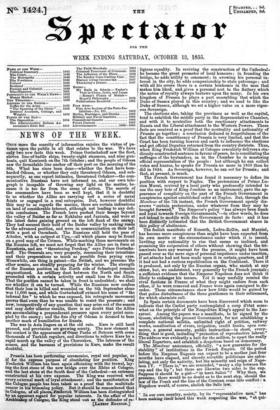Prussia has been performing ceremonies, royal and popular, as if
for the empress purpose of elucidating her position. King Frederick William has been again officiating with the trowel, lay- ing the first stone of the new bridge over the Rhine at Cologne, and the last stone at the South door of the Cathedral—an entrance constructed at his own expense. The King was received with every external mark of loyal attachment ; and the manifestation of the Cologne people has been taken as a proof that the multitude concur in his trimming poi1• . But it should be remembered that an Cologne, of all places, rick William has been distinguished popular interests. In the affair of the King stood out as the defender of re- [Limn Fannon%)
by anapparent Archbishop of Co
ligious equality. In reviving the construction of the Cathedral, he became the great promoter of local honours ; in founding the bridge, he adds utility to ornament ; in avowing his personal in- terest in the city, he adds companionship to state patronage ; and with all his errors there is a certain bonhomie in the man that makes him liked, and gives a personal zest to the flattery which the notice of royalty always bestows upon the many. In his own kingdom of Prussia he plays a part resembling that which the Duke of Sussex played in this country ; and we used to like the Duke of Sussex, although we set a higher value on a more vigor- ous Sovereign.
The elections also, taking the provinces as well as the capital, tend to establish the middle party in the Representative Chamber, and with it to neutralize both the reactionary attachments to Russia and the Liberal attachment to the Western Powers. These facts are received as a proof that the neutrality and nationality of Prussia go together; • a conclusion deduced in forgetfulness of the fact that the constituency of Prussia is very limited, and that the Court has been turning heaven and earth to influence the elections and get official Deputies returned from the country districts. Thus, when King Frederick William at Cologne oracularly delivers a stu- diously-constructed sentence in favour of peace, he is conciliating the suffrages of the bystanders, as in the Chamber he is mustering official representation of the people : but although he can collect votes and huzzas, he speaks for Prussia no more in 1855 than he did in 1854. As Sovereign, however, he can act for Prussia ; and that, at present, is much.
The French Government has found it necessary to define its position with respect to Naples. The pretensions of Prince Lu- cien Murat, revived by a local party who professedly intended to use the easy heir of King Joachim as an instrument, gave the ap- pearance of complicity on the part of the French Government in conspiracies against established order at Naples. But, through the Moniteur of the 7th instant, the French Government openly dis- avows "certain pretensions, under whatever form they may be brought forward." The Emperor's policy " has always been frank and loyal towards Foreign Governments,"—in other words, he does not intend to meddle with the Government de facto : and it has been distinctly intimated that the British Government shares in this policy of abstinence.
The foolish manifesto of Kossuth, Ledru-Rollin, and Mazzini, has become more conspicuous than might have been expected from its own merits or the circumstances under which it is issued. Inviting any nationality to rise that seems so inclined, and promising the cooperation of others without showing that the tri- umvirate have any warrant for the promise, it might have been. passed over as the mere sign of personal impatience under inaction, if set attacks had not been made upon it in certain.quarters, and if it had not had a curious republication on the Continent. There it is produced, not only by the Russian organs, who snatch at any straw, but, we understand, very generally by the French journals ; a sufficient evidence that the Emperor Napoleon does not think it likely to endanger his tenure. Yet it may usefully remind the rival factions in France of what they might endure from each other, if he were removed and France were again consigned to dis- order. These circumstances show how little would be gained by that police disturbance of the three gentlemen in their retirement, for which alarmists call.
In Spain certain documents have been discovered which seem to indicate that the Carlist party contemplated a coup d'etat some- what on the principle of the Neapolitan King's appeal to the Laz- zaroni. Among the papers was a manifesto, to be signed by the Queen, abolishing the present Government, for not establishing a complete national militia, unlimited right of petition, railway works, canalization of rivers, irrigation, credit banks, open com- merce, a general amnesty, public instruction—in short, every; thing that is good, including ' protection of reproductive labour. The address was evidently a bait for the million, to upset the really liberal Espartero, and establish a despotism based on democracy. The Moniteur announces, officially, "a new guarantee for the stability" of institutions in the French Empire. Of the period
before the Empress Eugenie can expect to be a mother just four months have elapsed, and already scientific politicians are calcu- lating, not only the nativity, but the minority and reign of Napo- leon IV. "There is," we are reminded, "many a slip between the
cup and the lip"; but there are likewise two aides to the cup. Suppose it should be a girl—" in terra Salina"? Why then, we presume, there would be no doubt as to the next step, should the law of the Frank and the line of the Corsican come into conflict : a Napoleon would, of course, abolish the Salle law.


























